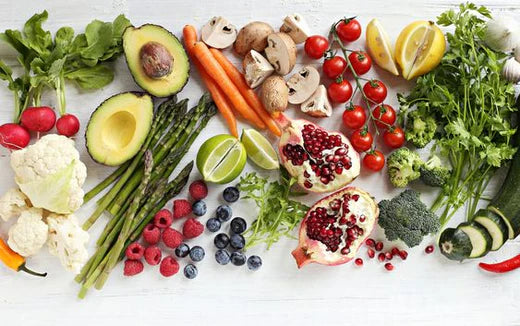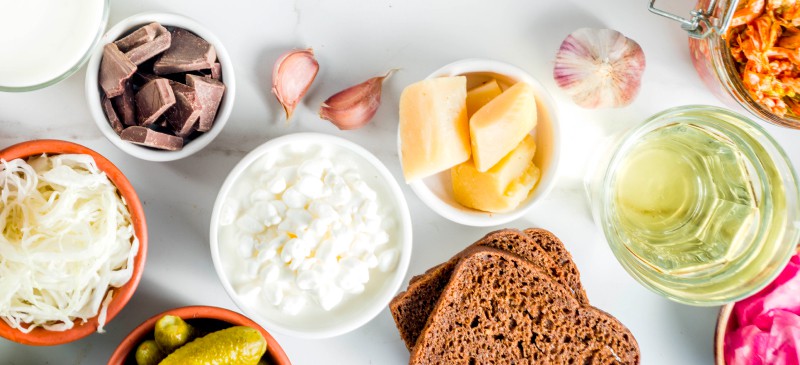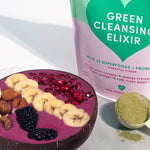
"The stomach is the farm of the body; it is where digestion takes place."
Digestion is one of the key roles of our stomach, which converts the food that we eat into energy. But, certain lifestyle changes and poor diet can upset our stomach, causing poor digestion.
Digestive problems can cause us to feel sluggish and unpleasant in our everyday lives. Whether it's occasional bloating or chronic constipation, improving digestion is critical for general health.
So, if you’ve googled “Are there ways to improve digestion?”, you’re in the right place, as in this blog, we’re about to look into 5 ways to improve digestion so you can never feel bloated or constipated again!
Eat Whole Foods

One of the most effective ways to combat digestive issues is to incorporate fibre-rich and whole foods into your diet. Fibre adds bulk to the stool, aiding in smoother bowel movements and preventing constipation. Include a variety of fruits, vegetables, whole grains, legumes, and nuts to ensure you're getting both soluble and insoluble fibre.
A comprehensive review, published in the Journal of Nutrition, examined the impact of whole foods on digestive health. It highlights that a diet rich in whole foods, including fruits, vegetables, and whole grains, provides essential nutrients and dietary fibre, promoting optimal digestive function.
Tip: Start your day with a hearty bowl of oatmeal topped with berries and nuts for a fibre-packed breakfast.
Stay Hydrated

Proper hydration is crucial for maintaining optimal digestion. Water helps soften the stool, making it easier to pass, and supports the overall function of the digestive system. Aim to drink an adequate amount of water throughout the day, and consider incorporating hydrating foods like watermelon and cucumber.
Tip: Carry a reusable water bottle with you to make it easier to stay hydrated, and flavour water with a splash of lemon for added digestive benefits.
Incorporate Probiotics

Probiotics are beneficial bacteria that promote a healthy gut environment. They help maintain a balance between good and bad bacteria, supporting digestion and immune function. Include fermented foods such as yoghurt, kefir, sauerkraut, and kimchi in your diet to introduce these friendly microbes to your digestive system.
Check out SkinnyMint’s ACV+ gummies and the Green Cleansing Elixir to have probiotics in a much more fun and tasty way! The apple-flavoured ACV+ gummies are only 10 calories a gummy while supporting your metabolism and gut.
Tip: Experiment with homemade yoghurt parfaits or try a new probiotic-rich recipe for added variety.
Practice Mindful Eating
 Slow down and savour your meals, as mindful eating can positively impact digestion. Chewing food thoroughly aids in the breakdown of nutrients and makes it easier for the digestive system to process. Additionally, being mindful of portion sizes can prevent overeating, reducing the likelihood of bloating and discomfort.
Slow down and savour your meals, as mindful eating can positively impact digestion. Chewing food thoroughly aids in the breakdown of nutrients and makes it easier for the digestive system to process. Additionally, being mindful of portion sizes can prevent overeating, reducing the likelihood of bloating and discomfort.
Tip: Put your fork down between bites, and pay attention to the flavours and textures of your food.
Engage in Physical Activity

Exercise isn't just beneficial for your cardiovascular health; it also plays a role in maintaining a healthy digestive system. Physical activity helps stimulate the muscles of the gastrointestinal tract, promoting more efficient movement of food through the digestive tract. Aim for at least 30 minutes of moderate exercise most days of the week.
A study, published in Sports Medicine, summarises research on the impact of exercise on gastrointestinal function. Regular physical activity is associated with improved digestive processes, including enhanced gut motility and blood flow.
Tip: Find an activity you enjoy, whether it's walking, cycling, or dancing, and make it a regular part of your routine.
From eating whole foods to engaging in physical activity, performing these tasks and staying consistent can help you improve your digestion naturally. Improving digestion is a holistic process that involves lifestyle and dietary changes. If digestive issues persist or worsen, it's important to consult with a healthcare professional for personalised advice and guidance.
You can also head over to our website and check out our range of health-friendly products to cleanse your body and improve your health! Till then, take care of your health and wish you the best for your day ahead!
Also Read: Everything You Need to Know About Berberine
FAQs
-
How can I improve my digestion naturally?
Ans. Focus on eating a balanced diet full of fruits, vegetables, whole grains, and nuts to improve digestion naturally. Drink lots of water to stay hydrated, and incorporate probiotics into your diet by eating foods like yoghurt and fermented foods. You should also develop good eating habits by not overindulging in food or skipping meals. In addition, take care of your tension, obtain adequate rest, and work out on a regular basis. -
What are the 5 ways that you can improve your digestion?
Ans.- Balanced Diet: Eat a mix of fruits, vegetables, whole grains, and nuts.
- Hydration: Stay adequately hydrated by consuming enough fluids.
- Probiotics: Include probiotics from foods like yoghurt and fermented items.
- Healthy Eating Habits: Avoid overeating and rushing meals for better digestion.
- Physical Activity: Engage in regular exercise to support overall digestive health.
-
What foods improve digestion?
Ans. Foods that improve digestion include fruits, vegetables, whole grains, nuts, probiotic-rich items like yoghurt, and fermented foods. These foods provide essential nutrients, fibre, and beneficial bacteria that contribute to a healthy digestive system. -
How can I make my stomach stronger?
Ans. Strengthening your stomach involves adopting healthy habits such as consuming a balanced diet, staying hydrated, incorporating probiotics, avoiding overeating, and maintaining a regular exercise routine. These practices contribute to better digestion and overall stomach health. -
Why is my digestion so poor?
Ans. Poor digestion can result from various factors, including an unhealthy diet low in fiber, high-stress levels, lack of physical activity, dehydration, and certain medical conditions. To address poor digestion, consider adopting a balanced diet, managing stress, staying hydrated, and seeking medical advice if issues persist.






